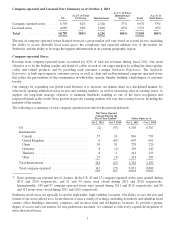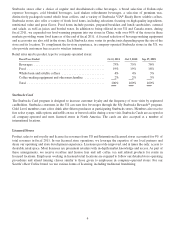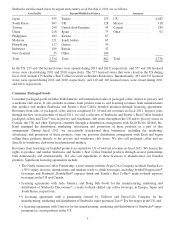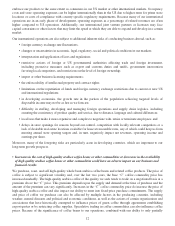Starbucks 2011 Annual Report Download - page 19
Download and view the complete annual report
Please find page 19 of the 2011 Starbucks annual report below. You can navigate through the pages in the report by either clicking on the pages listed below, or by using the keyword search tool below to find specific information within the annual report.mitigate future price risk through purchasing practices and hedging activities, increases in the cost of high-quality
arabica coffee beans could have an adverse impact on our profitability. In addition, if we are not able to purchase
sufficient quantities of green coffee due to any of the above factors or to a worldwide or regional shortage, we may
not be able to fulfill the demand for our coffee, which could have an adverse impact on our profitability.
In addition to coffee, we also purchase significant amounts of dairy products, particularly fluid milk, to support the
needs of our company-operated retail stores. Although less material to our operations than coffee or dairy, other
commodities including but not limited to those related to food inputs and energy, are important to our operations.
Increases in the cost of dairy products and other commodities could have an adverse impact on our profitability.
•Our success depends substantially on the value of our brands.
We believe we have built an excellent reputation globally for the quality of our products, for delivery of a
consistently positive consumer experience and for our corporate social responsibility programs. The Starbucks brand
has been highly rated in several global brand value studies. To be successful in the future, particularly outside of US,
where the Starbucks brand and our other brands are less well-known, we believe we must preserve, grow and
leverage the value of our brands across all sales channels. Brand value is based in part on consumer perceptions on a
variety of subjective qualities. Even isolated business incidents that erode consumer trust, such as contaminated food
or privacy breaches particularly if the incidents receive considerable publicity or result in litigation, can significantly
reduce brand value. Consumer demand for our products and our brand equity could diminish significantly if we or
our licensees fail to preserve the quality of our products, are perceived to act in an unethical or socially irresponsible
manner or fail to deliver a consistently positive consumer experience in each of our markets.
•Our business depends in large part on the success of our business partners and suppliers, and our brand and
reputation may be harmed by actions taken by third parties that are outside of our control.
Our business strategy, including our plans for new stores, foodservice, branded products and other initiatives, relies
significantly on a variety of business partners, and licensee and partnership relationships, particularly in our
international markets. Licensees are often authorized to use our logos and provide branded beverages, food and other
products directly to customers. We provide training and support to, and monitor the operations of, these business
partners, but the product quality and service they deliver may be diminished by any number of factors beyond our
control, including financial pressures. We believe customers expect the same quality of products and service from
our licensees as they do from us and we strive to ensure customers have the same experience whether they visit a
company-operated or licensed store. Any shortcoming of a Starbucks business partner, particularly an issue affecting
the quality of the service experience,the safety of beverages or food or compliance with laws and regulations, may
be attributed by customers to us, thus damaging our reputation and brand value and potentially affecting our results
of operations.
Our food and beverage products, are sourced from a wide variety of domestic and international business partners in
our supply chain operations. We rely on these suppliers and vendors to provide high quality products and to comply
with applicable laws. Our ability to find qualified suppliers and vendors who meet our standards and supply products
in a timely and efficient manner is a significant challenge, especially with respect to goods sourced from outside the
US. A vendor or supplier’s failure to meet our standards, provide products in a timely and efficient manner, and
comply with applicable laws is beyond our control. These issues could negatively impact our business and
profitability.
•Failure to meet market expectations for our financial performance will likely adversely affect the market price
and volatility of our stock.
Failure to meet market expectations going forward, particularly with respect to operating margins, earnings per
share, comparable store sales, operating cash flows, and net revenues, will likely result in a decline and/or increased
volatility in the market price of our stock. In addition, price and volume fluctuations in the stock market as a whole
may affect the market price of our stock in ways that may be unrelated to our financial performance.
13
























